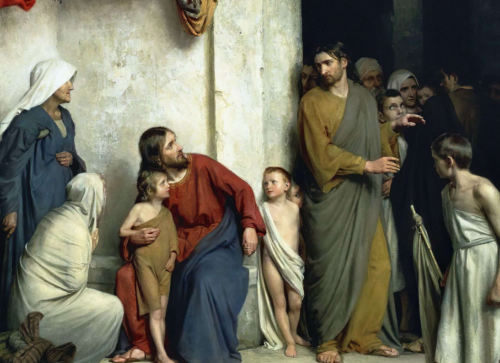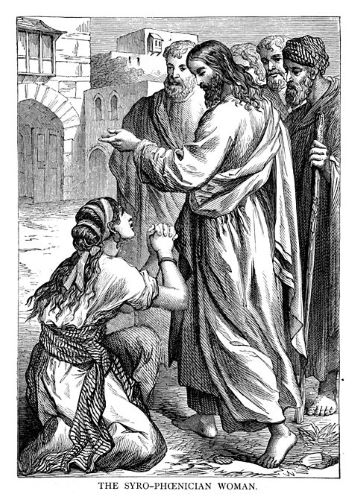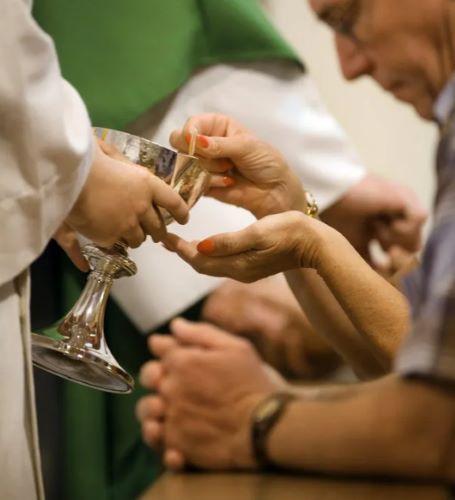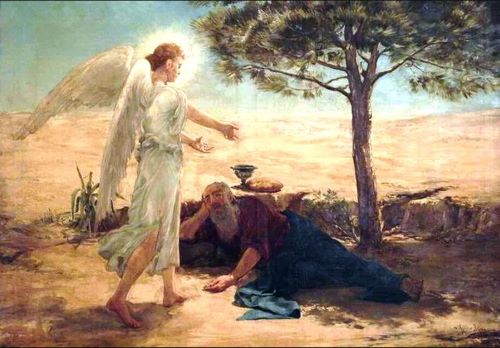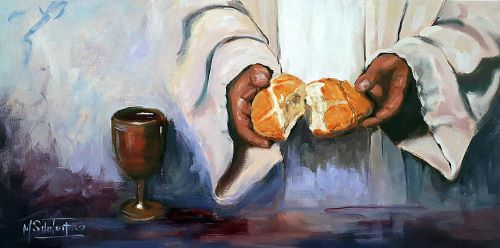Who Feeds Us?
Year A
Exodus 16:2-15
Psalm 105:1-6, 37-45
Philippians 1:21-30
Matthew 20:1-16
May the words of my mouth O God… speak your truth…
Our reading from Exodus today… shines a light on… and helps better understand today’s Gospel… because in the wilderness… the Israelites grumbled against Moses and Aaron… as the laborers grumbled against the vineyard owner… in the wilderness… the Israelites compare what they have… against what they had… and said that it would have been better if they had died… surrounded by the cauldrons… the stewpots… the fleshpots of Egypt… where they had their fill of meat and bread… though as an aside… I wonder if as slaves… that was a memory wrapped in wishful thinking… but anyhow… in response to their kvetching… God said… I am going to rain bread from heaven each morning… and we’ll see whether they follow my instructions or not… and what was the instruction… that the people go out every day… and gather enough for just that day… God said… Gather as much of it… as each of you needs… an Omer for each person according to the number of persons for those in their own tents… and an Omer by the way… is little more than half a gallon… ] and in the evening… quails covered the camp for them to catch and cook… meat and bread to satisfy their physical hungers… but in verse 19… there’s a caveat… Moses said to them… Let no one leave any of it over until morning… but they didn’t listen to Moses… some left part of it until morning… and it bred worms and became foul… and Moses became angry… but on the sixth day… but on the day before Shabbat… they gathered twice as much food… and when the leaders of the congregation came… he told them… tomorrow is a day of solemn rest… a holy sabbath to the LORD… bake what you want to bake and boil what you want to boil… and this time… put aside what’s left over until the morning… and it did not become foul… and there were no worms in it… and Moses said… Eat it today… for today is a sabbath to the LORD…
And the lesson I think this passage is trying to teach us… is that God provides what collectively… we need… though its distribution may be erratic… may be uneven… because of human greed… perhaps that’s why the United Auto Workers are striking… to effect an outcome with management that’s more equitable… ] in an article in the Christian Century magazine… biblical scholar Walter Brueggemann affirms that God created a world of great abundance… but God’s economy isn’t western culture’s and much of the world’s economy… God’s economy doesn’t hoard or save without purpose… like the rich young man whose harvest was more than his barn could hold… and so rather than share his excess with those in need… he decided to build bigger barns… ] God provides… without wasting… and if we share… if enough of us share… there’d without a doubt… be enough for all… so in the wilderness… in a place that’s stripped of all the things which distract them from God… the Israelites learned to rely on God each day…
And we can say that today’s Gospel attempts to express a basic spiritual truth about each person’s relationship with God… because God is like a landowner seeking people to work on the home estate… and we are like day laborers… ] socially… day laborers are a vulnerable group… they don’t have a permanent job… but are dependent on being called each day… like migrant workers… and the spiritual reality is that people have no claim on God… but each day God calls people to work in the world… and the agreement is… that if people work for God day by day… God will sustain their life day by day… and we can say that being paid the usual daily wage… will provide what is necessary in the present… ] like the Israelites in the wilderness… the vineyard workers are not given enough for the next day… if they were… they might envision a life outside of continued divine support… just as in the Lord’s Prayer… we are encouraged to pray for today’s daily bread… ] God does not give more and God does not give less than we need… it’s we who upset the balance by saving and hoarding… and we delude ourselves into thinking that we are self-sufficient people capable of living outside of God’s love… in fact… I once worked with a retired Church of the Brethren minister… and he told me that it was his church’s practice to exhaust their financial resources each year… to zero-out their checking account… or risk coming to believe that they had no need of God’s providence…
And as Fr. John Shea writes… by going out several times throughout the day… the landowner notices that there are idle laborers… and it seems that he’s concerned with unproductive people… who are unproductive precisely because they have not been called to work… ] and when it comes to all of them being paid the same… regardless of how long they worked… what the landowner has done… is make all people who work in his vineyard equal… the landowner gives the same wage to everyone…
But I wonder… last week’s passage from Matthew talks about forgiveness… Matthew 18:21-35 starts off with Peter coming to Jesus and asking… Lord… if another member of the church sins against me… how often should I forgive… as many as seven times… and Jesus answers… Not seven times… but seventy-seven times… and Jesus launches into the Parable of the Unforgiving Servant… who owed the King 10,000 talents… and one of his fellow servants owed him a mere 100 denarii… the denarius was one day’s wage for a laborer who worked six days a week… so with a Sabbath day of rest… and allowing for various Jewish holidays… the typical laborer worked 50 weeks each year… and earned an annual wage of 300 denarii…
And one talent was about 6,000 denarii… so it would take twenty years to pay back one talent… but this poor fellow owed the King 10,000 talents… so if it takes twenty years to earn one talent… it would take 200,000 years to repay 10,000 talents… so that was one VERY forgiving King… but as soon as we come to today’s parable… our brains shift from what we have to pay… to what we think we deserve… to what’s fair for us… to erroneous categories of what we’re owed…
And while there may be some truth when it comes to dollars and cents… or denarii… I suggest that there may be another layer of truth… I suggest we consider who the vineyard owner is and their generosity… I suggest that what’s actually being paid… I suggest the currency that’s actually being given… remembering last week’s Gospel… is forgiveness… the same daily wage of extravagant forgiveness… wholly unearned… and which puts all those who were called on the same level playing field… as it were…
It’s Peter who in last week’s Gospel asks Jesus about forgiveness… ] and given how close to each other these two parables are… and that the landowner calls the one who questions his generosity friend… we can infer that Peter is the one called friend…
Shea writes… Peter and the disciples will get the usual daily wage… because this is what they agreed on… in other words… it’s assumed that they have finally grasped the truth about God… that Jesus has struggled to communicate to them… ] and when people “seek the kingdom first” and pray to follow God’s will… there’s really no need to ask for what you need… because God already knows what those who work in the vineyard need… and what is justice for the landowner… is always the usual daily wage…
And in the final line of the parable… So the last will be first… and the first will be last… we find a significant reversal… these words highlight the inadequacy of comparative thinking when we’re dealing with spiritual reality… because first and last are social categories… ] and so we’re left with God’s question… Am I now allowed to do what I choose with what belongs to me… and our answer has to be that there’s nothing that doesn’t belong to God…

